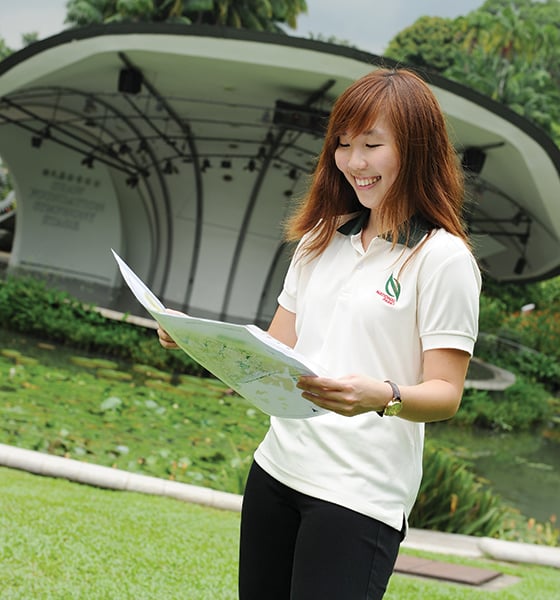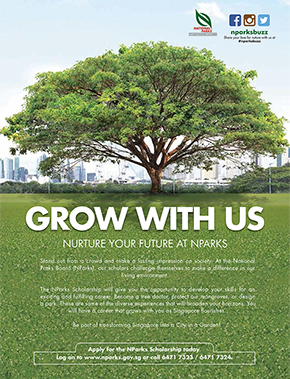W ith lush flora and an array of biodiversity, Singapore is known as one of Asia’s greenest cities. Our country is home to four nature reserves and over 350 parks, all of which are under the purview of NParks.
NParks scholar Toh Wan Ting shares more about her role in achieving Singapore’s vision of being a City in a Garden.
What motivated you to apply for a scholarship with NParks?
Toh Wan Ting: I have always loved nature since young. Hence, when the time came for me to choose a career path, it was inevitable that I would learn more about the organisation that manages most of the green spaces in Singapore. NParks definitely made an impression! I saw the NParks scholarship as a gateway for me to shape Singapore’s living environment.
Tell us more about your job.
Wan Ting: As a Park Planning Manager, my key responsibility is to help safeguard land for parks and park connectors. At a macro level, this involves reviewing land-use plans together with other agencies and ensuring that park space is adequately provided for. As there are often space constraints, it is common for us to have to negotiate with other agencies and develop solutions such that park provision is not compromised.
Internally, we work with other divisions in NParks to develop a diverse, well-distributed and connected network of parks and assist in its implementation. We study the development potential of spaces safeguarded for parks by conducting both desktop studies and site recces to assess their location, terrain, the catchment they would serve and whether there is synergy with nearby developments. We then help to secure planning approval for the project and facilitate allocation of the land required. Part of our work is also to formulate and review existing park provision policies and guidelines.
What notable projects have you worked on?
Wan Ting: I had the chance to work on the Round-Island-Route project, which involves building a seamless green corridor that spans 150km around the periphery of Singapore. It will link heritage areas in the city, coastal spots in the East and rustic greenery in the North and West, providing a new recreational experience for the public. With the extensive reach of the Round-Island-Route, I hope that more people will be better connected with their loved ones, further enabling them to explore Singapore together.

Toh Wan Ting
NParks Overseas Undergraduate Scholar
Manager (Park Planning)
Could you tell us more about NParks’ role in managing Singapore’s green spaces and environment?
Wan Ting: Creating our “City in a Garden” is no simple task! The management of our green spaces can be broken down into many different but interlinked areas. For example, we actively study population trends and public feedback to ensure that sufficient park land is secured and that the appropriate types of park spaces are developed.
There is also the need to respond to the constantly changing environment – particularly its rapid development, climate change and the unpredictable weather conditions it brings. This pushes us to develop new technical solutions to ensure flora and fauna can continue to thrive despite the constraints. Facilitating the interaction between people and nature is another important aspect of our work, and we work with the public to create green spaces together in the form of community gardens.
What opportunities have you enjoyed as an NParks scholar?
Wan Ting: The NParks scholarship enabled me to pursue a unique field of study in an overseas environment and paved the way for me to enjoy even more enriching experiences. Academically, I benefited from the variety of international students that University College London attracts. It was interesting being able to analyse urban issues with inputs from people of varied backgrounds.
Beyond that, an invaluable part of my educational experience was the summer expeditions I got to participate in. I joined a month-long research expedition to South Africa which brought me to the savannah of the Thanda Reserve. There, I assisted in a vegetation survey to assess the level of habitat damage caused by elephant feeding pressure. The opportunity to visit such unique habitats and immerse myself within them is something I will never forget.
I also had the opportunity to go to the Peruvian Amazon. This project taught me different skills and techniques in field data collection, and the environmental and ecological issues involved. This also gave me a taste of the work involved in conservation – an area that is relevant to NParks’ work but not covered in detail in my studies.
Share with us about your internship experiences.
Wan Ting: During my first summer break, I had the opportunity to do an internship at NParks’ Park Planning Branch. The experience was essential to my understanding of planning as a whole, planning in Singapore and NParks’ role in it. It provided me with greater insight into what I was studying and how it could be applicable in my future work. It also gave me the chance to interact with the NParks family and forge relationships with my future colleagues.
I also had the opportunity to intern at Gardens by the Bay during its development phase. It was truly eye-opening to witness the scale of works that went on behind the scenes – from the construction of the mega structures to the immense variety and amount of plants that were being cultivated. I was highly impressed with the level of thought put into every detail.
Besides internships, how else does NParks facilitate the overall development of its staff?
Wan Ting: NParks organises a whole spectrum of seminars and courses, which staff are encouraged to attend. There is generally no limit to what we are allowed to attend – for example, I could sign up for Tree Inspection On-The-Job Training or a park management course for greater exposure, even though my work may not directly involve operations work. As a whole, NParks cultivates an open and a positive environment for us to learn!

